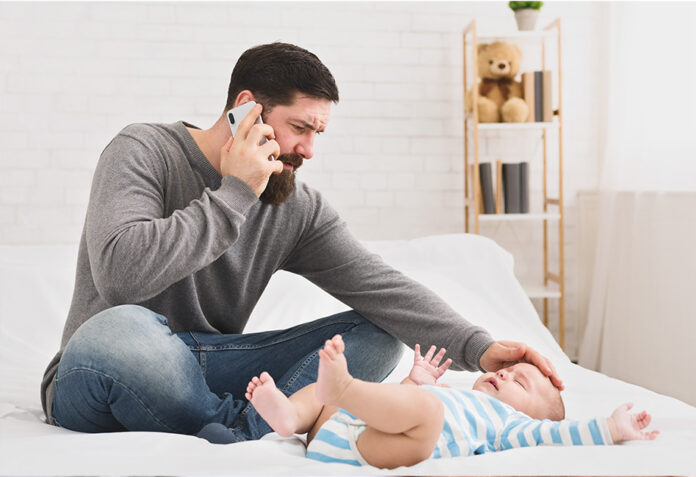Becoming a father is a joyous and transformative experience. However, various emotions, including anxiety, can also accompany it. Acknowledging and addressing the concerns of new dads experiencing anxiety is essential. In this article, we will explore the reasons behind new dad anxiety, discuss the prevalence of this issue, identify signs of anxiety in new dads, and provide well-defined solutions to cope with anxiety in an empathetic tone.
Why and When Does Anxiety in New Dads Happen?
The transition to fatherhood brings significant changes to a man’s life. The combination of increased responsibilities, sleep deprivation, financial concerns, and adjusting to a new routine can lead to feelings of anxiety in new dads. Additionally, the pressure to be a perfect father and provide for the family can contribute to anxiety in new dads.
Anxiety can occur during the fatherhood journey, from the anticipation of the baby’s arrival to the early months of caring for the newborn. Each phase presents unique challenges that can trigger anxiety in new dads. Remember that anxiety is a normal response to change, and the desire to protect and care for a newborn is essential.
How Common Is Anxiety in New Dads?
Anxiety in New dads is more common than you might think. According to a recent National Institute of Mental Health study, about 1 in 10 new fathers experience anxiety symptoms during the first year of their child’s life. These numbers highlight the significance of this issue and emphasize the need for support and understanding for new dads.
Signs that a New Dad is Feeling Anxiety
Recognising the signs of anxiety in new dads is crucial to providing appropriate support and intervention. Some common signs and symptoms include:
- Excessive Worry: Anxiety in New Dads may exhibit excessive worry about the baby’s health, safety, or ability to fulfill their role as a father.
- Irritability and Restlessness: Anxiety in New Dads can manifest as irritability and restlessness, making it challenging for new dads to relax or enjoy quality time with their baby and partner.
- Physical Symptoms: Anxiety in New Dads can also have physical manifestations such as headaches, gastrointestinal discomfort, and difficulty sleeping.
- Avoidance: Some new dads may avoid situations or responsibilities that trigger their anxiety, leading to withdrawal or disengagement.
- Hyper-Vigilance: Anxiety in new dads may cause them to be overly vigilant and excessively concerned about potential dangers or risks, leading to increased stress levels.
How to Cope with Anxiety as a New Dad
Coping with anxiety as a new dad requires a combination of self-care, support, and seeking professional help when necessary. Here are some well-defined solutions to help new dads manage their anxiety:
- Open Communication
Maintaining open and honest communication with your partner is vital. Share your fears, concerns, and anxieties with your significant other. Partners can support by actively listening, offering reassurance, and sharing parenting responsibilities. Creating a safe and non-judgmental space for open communication and understanding is crucial in supporting a new dad with anxiety.
- Seek Support
Reach out to friends, family, or support groups specifically designed for new fathers. Sharing your experiences and connecting with others going through similar challenges can provide a sense of validation and perspective. Remember, you are not alone in this journey.
- Take Breaks
It’s essential to take regular breaks to recharge and rejuvenate. Arrange for time off from parenting duties and engage in activities that bring you joy and relaxation. This will help reduce stress levels and promote overall well-being.
- Practice Self-Care
Prioritize self-care activities that promote mental and physical well-being. Exercise regularly, get enough sleep, and maintain a healthy diet. Consider incorporating relaxation techniques such as deep breathing exercises, meditation, or mindfulness practices into your daily routine.
- Set Realistic Expectations
Recognize that being a perfect father is an unrealistic expectation. Strive for progress, not perfection. Allow yourself to make mistakes and learn from them. Embrace the learning curve of parenthood and celebrate small victories along the way.
- Lifestyle change
lifestyle changes such as regular exercise, a healthy diet, and sufficient sleep can contribute to managing anxiety. Engaging in activities that promote relaxation and self-care can also positively impact mental well-being.
- Professional Help
If your anxiety becomes overwhelming and interferes with your daily functioning and well-being, do not hesitate to seek professional help. A psychologist or therapist can provide valuable guidance, support, and evidence-based strategies to manage anxiety effectively.
Anxiety in new dads is not a sign of weakness. It is a normal and understandable response to the significant life changes and responsibilities that come with fatherhood. Seeking support and addressing anxiety demonstrates strength and commitment to one’s and the family’s well-being. Coping with anxiety as a new dad is an ordinary and everyday experience. Recognizing the signs of anxiety, providing support, and promoting open communication is essential. Remember, seeking help is a sign of strength; you are not alone in this journey.




